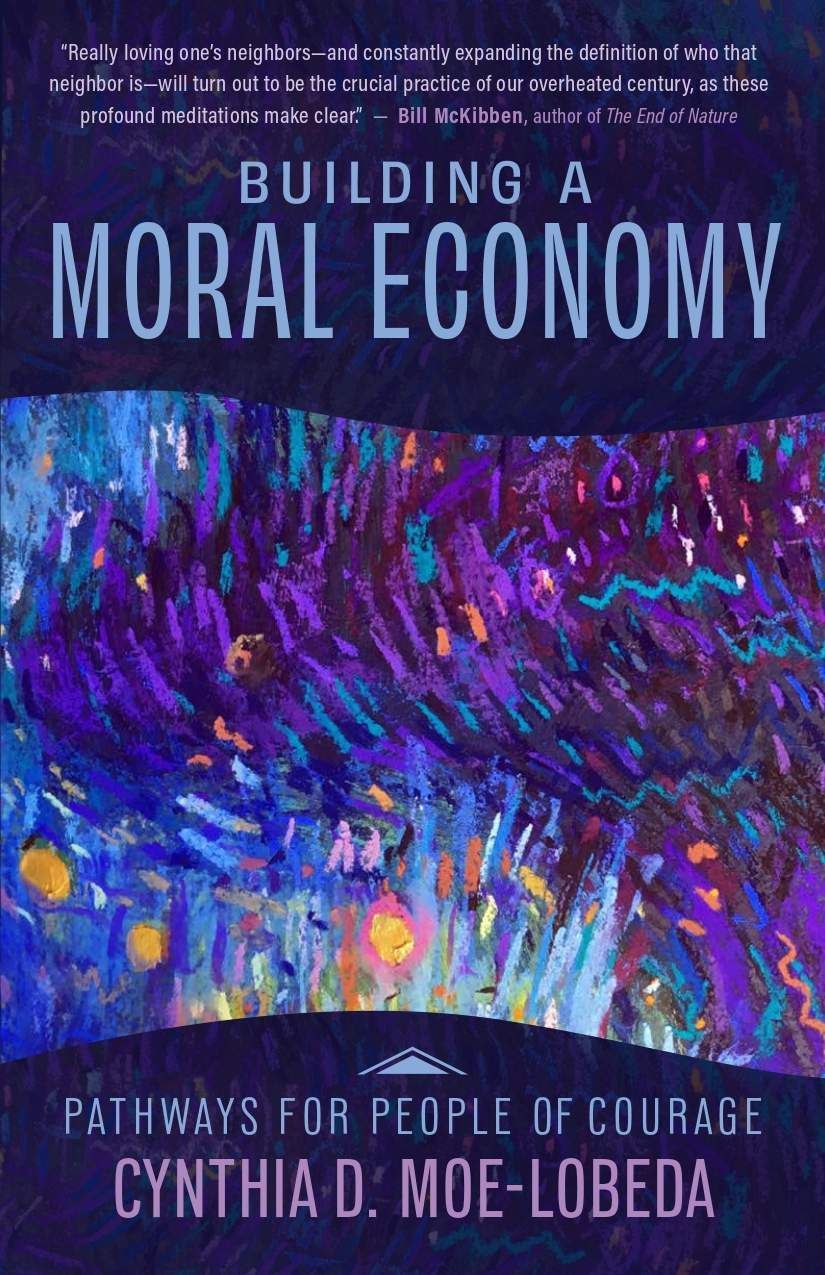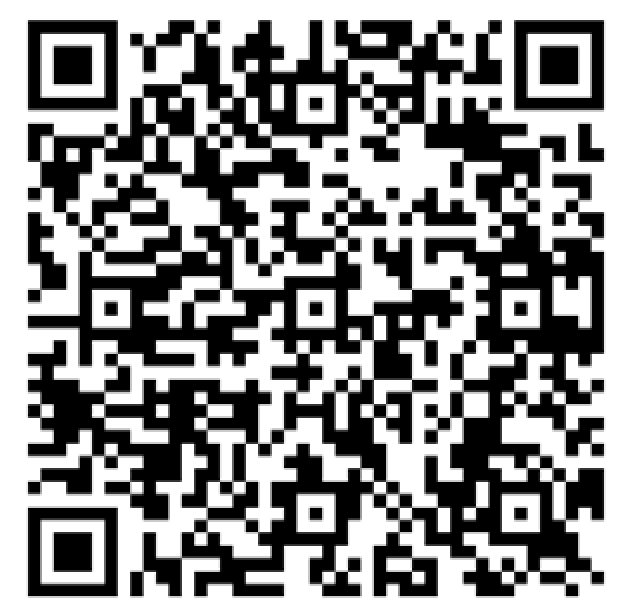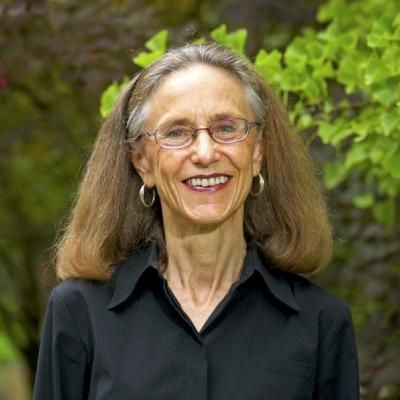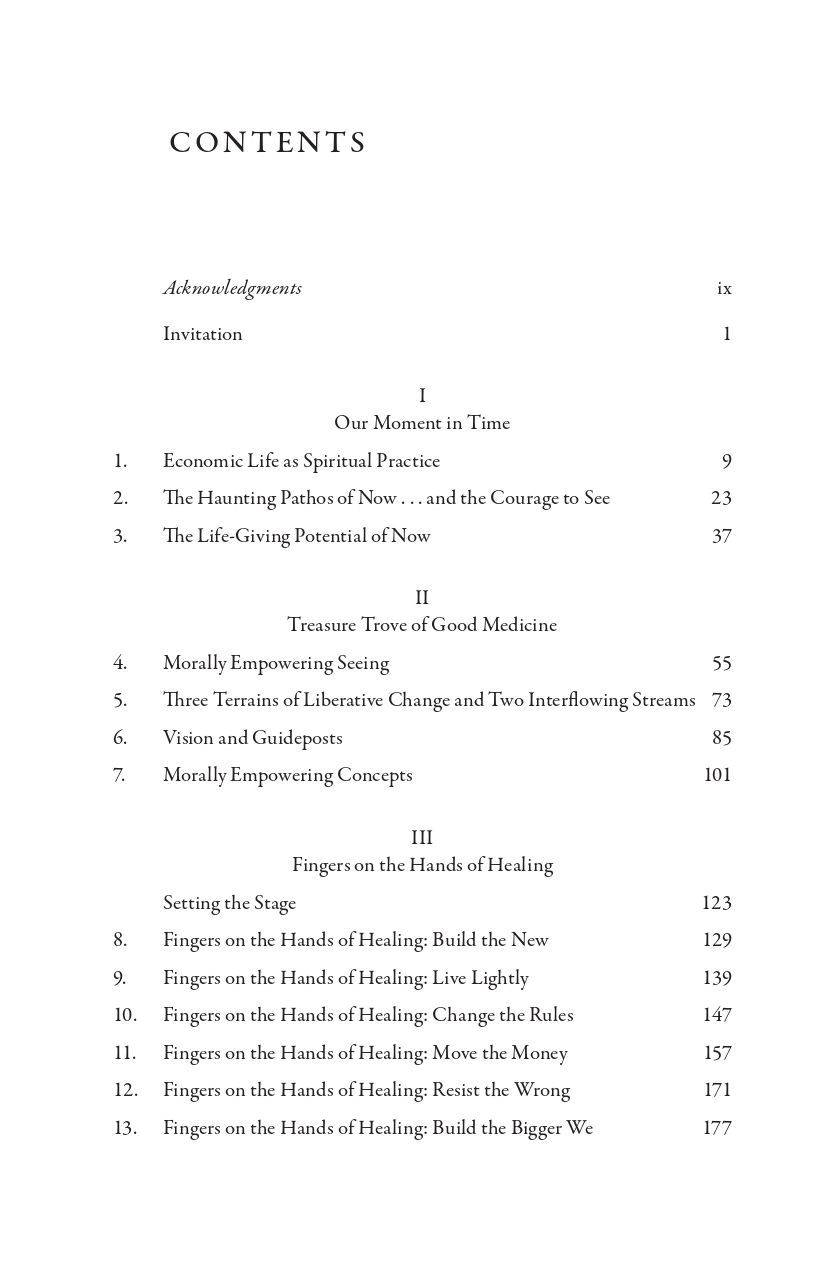“A tour de force….path-breaking and life-changing.” - Mary Evelyn Tucker (USA)
“What a feast of life…this remarkable, impressive, and timely volume.” - Upolu Lumā Vaai (Fiji)
“…A healing gift….brilliant…transformative and practical….The book brims with so much hope!” - Athena Peralta (Switzerland and Philippines)

You Have The Power Today To Change Tomorrow
"This luminous book brims with the spirited moral care and scholarly brilliance that mark all of Cynthia Moe-Lobeda’s work. But Building a Moral Economy is her most personal, engaging, and capacious book - inviting readers to join the building of an already-emerging moral economy." - Gary Dorrien
"A tour de force….path-breaking and life-changing.” - Mary Evelyn Tucker
“Practical, embodied and faithful…a courageous guide filled with ideas, tools, and vision for the future of the planet.” - Raj Patel

Slide title
Write your caption hereButton
Trailer Of Book
Trailer created by undergraduate class in television production at California Lutheran University: Joshua Casanova, Amaya Charles, Andrew Johnson, Victoria Peterson, Abbey Saucedo, Lillian Schmidt, Kara Zaccaro. Led by Professor David Grannis. Music by Kara Zaccaro. Voiceover by Maggie Stenson.
Buy The Book
(Scan the QR code)

Praise for Building a Moral Economy
Athena Peralta
Rev. Adam Russell Taylor
Raj Patel
Richard B. Norgaard
Mary Evelyn Tucker
Larry Rasmussen
Kwok Pui-lan
Kim Stanley Robinson
Catherine Keller
Allan Aubrey Boesak
Pamela Haines
Betsy Leondar-Wright
Rev Professor Dr Upolu Lumā Vaai
Liz Theoharis
Kathryn Tanner
Ryan P. Cumming
Rev. dr. abby mohaupt
Gerald O. West
Marjorie Kelly
Rev. Rebecca Barnes
Rev. Dr. Kuzipa Nalwamba
Bill McKibben
Athena Peralta
Rev. Adam Russell Taylor
“Our decisions and actions will shape the fate of life on Earth. None before us have borne this moral weight. What we do matters! It is, therefore, a good time to be alive.”
Cynthia Moe-Lobeda
“Imagine a different relationship in which people and land are good medicine for each other.”
Robin Wall Kimmerer
Resources for Building a Moral Economy:
A Toolkit
See
Global Environmental Justice and Economic Life
• Global Environmental Justice Documentaries https://gej.docuseek2.com/
Curated collection of 48 documentaries, many of them excellent, with study guides. Capturing ecological, social, and public health crises, these documentaries bring the neglected stories of marginalized communities to light. Real, relatable people [are] portrayed within their diverse cultures and everyday lives as they are impacted by pollution, globalization, climate change, civil war, ecosystem loss, and corporate power...
• The Story of Stuff series. https://www.storyofstuff.org/movies/
Many excellent very short films including The Story of Stuff.
• Plastic China. https://gej.docuseek2.com/gj-022a
Plastic China’s main character, Yi-Jie, is an unschooled 11-year-old girl whose family works and lives in a typical plastic waste household-recycling workshop. This is her world. Plastic China reveals the unsafe conditions in which adults and children alike toil, as they seek to eke out a basic living by processing toxic plastic waste products that they know are polluting their rivers and lakes, contaminating the air that they breathe, and compromising their health in noticeably painful ways. The film exposes not only a disparity between Western lifestyles of consumption and those who deal with the concomitant waste, but also in the hierarchical structure of facility owners and the workers they employ for low compensation in unhealthy and sometimes abusive environments.
Indigenous Communities, Environmental Justice, and Economic Life
If Not Us, Then Who series. https://gej.docuseek2.com/gj-040a
A series of seven brief films highlighting victories of Indigenous people in struggles for climate justice and other forms of environmental justice. We see Indigenous peoples’ will, strength, and determination in standing up for their homelands and communities in the face of corporations, oppressive government entities, and other threats. We witness the impact of the women’s movement on the women of the babassu forest, traditional teaching by the elders of the Sungai Utik people, and successes in reclaiming forests that are people’s homes.
Economy, Climate Change, and Race
• Cooked: Survival by Zip Code https://gej.docuseek2.com/gj-041a
This 54 minutes film is the story of a severe example of environmental injustice. filmmaker Judith Helfand argues that there is an inextricable connection between environmental injustice and racism as she explores the impact of the 1995 Chicago heat wave that caused hundreds of deaths. 739 citizens of Chicago died in a heat wave in a single week, most of them poor, elderly, and African American. An examination of this and similar disasters reveals structural inequalities that make poor communities and communities of color vulnerable to these events. The film questions existing policies that ignore these kinds of structural inequities that endanger and kill people who live in the “wrong” zip code.
• https://www.pbs.org/wnet/peril-and-promise/series/freedom-to-breathe/
A series of brief films: Who has the Freedom to Breathe in the U.S.? Those who live and work on the front-lines of climate change will tell you that climate change is affecting Americans’ well-being right now. The Nexus Media team makes stops across the Southern and Southwestern United States from Albuquerque, New Mexico to Miami, Florida to see this firsthand. They reveal how climate change and fossil fuel pollution are impacting people’s day-to-day lives through health, housing, and the economy — just to name a few. This series highlights the intersection between climate change and the racial, social, and economic challenges we face — and the solutions that exist.
• https://www.youtube.com/watch?v=t97xwp-EUyY.
A short film produced by Climate Justice for All, a climate focused youth-led global campaign of the Methodist church worldwide.
• https://www.youtube.com/watch?v=jY2eWJ-U_VQ
A short film, “Climate Justice is Social Justice” by Earthrise.
• https://www.youtube.com/watch?v=pHRu0VV-Dbw
Excellent 10-minute introduction to climate justice on a global scale.
Economy and Housing
• “Renter Revolt: Housing and Human Rights in America’s Homeland.” https://www.youtube.com/watch?v=aQWXQNbrVRg
• “Sold Out: Affordable Housing at Risk.” https://www.pbs.org/show/sold-out-affordable-housing-risk/
PBS documentary sharing tenant stories, and lifting up solutions to loss of affordable housing.
Food Justice
Food Chains
Other
• A House Divided https://americadividedseries.com/
Vision of What Is Possible
• https://www.youtube.com/watch?v=2m8YACFJlMg&t=312s
A hopeful visionary animated film about the new equitable ecological democratic economy that is possible. Produced by Intercept and Naomi Klein. Co-launched by: Via Campesina, Amazon Watch, NDN Collective, Movement for Black Lives, Greenpeace International, Haymarket Books, Sunrise Movement, and others. (8 minutes)..
Article about the film at: https://theintercept.com/2020/10/01/naomi-klein-message-from-future-covid/
Religion and Moral-spiritual Power for Economic Transformation
• https://vimeo.com/110615115: “Searching for Sacred Mountain”
A 20-minute film. Journalist Liu Jianqiang and conservation biologist Lü Zhi discover a new way of looking at environmental conservation on the Tibetan Plateau, where Buddhist monks and villagers have preserved vast tracts of land for centuries. “Everyone has a responsibility to protect life,” Buddhist lama Tashi Sange says, “no matter if you are just born, or 80 years old.”
• https://www.youtube.com/watch?v=WmP1C-4eLbI
Religious leaders in Africa condemning EACOP (the East Arica pipeline) ( 3.5 minutes)
Read
General Reading on Building Ecological, Equitable, Democratic Economic Life
Doughnut Economics by Kate Raworth
Take Back the Economy by J.K. Gibson-Graham, Jenny Cameron, and Stephen Healy
Buddhist Economics by Clair Brown
This Changes Everything by Naomi Klein
The Sum of Us: What Racism Costs Everyone and How We Can Prosper Together by Heather McGhee
Braiding Sweetgrass by Robin Wall Kimmerer
The Green New Deal and Beyond: Ending the Climate Emergency While We Still Can by Stan cox
Poverty by America by Matthew Desmond
The True Cost of Low Prices by Vincent A. Gallagher
The Spirit of Soul Food: Race, Faith, and Food Justice by Christopher Carter.,
“The Carbon Majors Database: CDP Carbon Majors Report 2017” at https://tinyurl.com/2s3meeyy.
Fingers on the Hands of Healing Change: Build the New (Chapter 8)
• Emily Kawano and Julie Matthaei. “System Change: A Basic Primer to the Solidarity Economy, in Non-Profit News Nonprofit Quarterly. https://nonprofitquarterly.org/system-change-a-basic-primer-to-the-solidarity-economy/
Fingers on the Hands of Healing Change: Live Lightly (Chapter 9)
• https://rebellion.global/blog/2022/09/07/climate-change-your-fault/
An excellent article exploring the relationship of lifestyle change to systemic change (two of three terrains of change explored in this book series).
Fingers on the Hands of Healing Change: Change the Rules (Chapter 10)
• https://peopleseconomy.org/about-the-toolkit/
A toolkit and guide for public policy action for a new economy, produced by the New Economy Coalition.
Fingers on the Hands of Healing Change: Move the Money (Chapter 11)
• Cooler Earth - Higher Benefits
• IPCC AR6 Factsheet on Climate Finance
• Aligning your banking with sustainability goals
• How to switch to better banks and credit cards
• Move Your Money: guide and campaign
• “Invest Divest: A Decade of Progress Towards a Just Climate Future” produced by the Institute for Energy Economics and Financial Analysis, Stand. Earth, C40, and the Wallace Global Fund.
• Celia Bottger, Rachel Eckles, Bianca Hutner, Sarah Jacqz, Emily Thai, “The Reinvest Report” (Boston: The Solidarity Economy Initiative, 2018).
• David Haslam, “The Bible and Tax” (Birmingham, UK: Methodist Tax Justice network, 2014).
• “Zactax Toolkit,” produced by Council for World Mission, Lutheran World Federation, World Communion of Reformed Churches, World Council of Churches, World Methodist Council,
• Zactax Toolkit.
• “Global Tax Justice – Key Actors and Key Aims” produced by the Methodist Tax Justice Network.
• “Tax for the Common Good,” produced by Church Action for Tax Justice
Poetry related to Justice in Economic Life
Banana by Paul Hlava Ceballos
Move the money
https://www.cbsnews.com/news/presbyterian-church-divest-from-fossil-fuel-companies-climate-concerns/
Meet
Build the New (Chapter 8)
Organizations/networks/websites:
• Doughnut Economics Action Lab at (https://doughnuteconomics.org/).
• US Solidarity Economy Network at https://ussen.org/
• International Network for the Promotion of Social Solidarity Economy at http://www.ripess.org/
• The New Economy Coalition at https://neweconomy.net/
• Climate Justice Alliance
• The Democracy Collaborative at https://democracycollaborative.org/
• Center for Economic Democracy at https://www.economicdemocracy.us/
• The International Cooperative Alliance
• La Via Campesina at https://viacampesina.org
• Local Futures at https://www.localfutures.org
• Common Future (formerly BALLE – Business Alliance for Local Living Economies) at https://www.commonfuture.co/
• The Cooperatives and Churches toolkit launched by the Wendland-Cook Program at Vanderbilt University and the Southeast Center for Cooperative Development, at https://www.co-opsnow.org/tool-kit
• Wellspring Cooperative Corporation at https://wellspringcoop.org/
• Sustainable Economies Law Center at https://www.theselc.org/
• Beloved Community Incubator at https://www.belovedcommunityincubator.org/
• Grace in Action Collectives at https://www.giacollectives.org/
• Evergreen Laundry
• Mondragon
• Planting Justice
• Soul Fire Farm
• Agrarian Trust
• Central Virginia Agricultural Commons
• Black Church Food Security Network at https://blackchurchfoodsecurity.net/
• Black Food Sovereignty Coalition at https://blackfoodnw.org/;
• RIPESS (Intercontinental network for the promotion
of social solidarity economy) http://www.ripess.org/?lang=en
• U.S. food Sovereignty Alliance at http://usfoodsovereigntyalliance.org/
• Via Campesina at https://viacampesina.org/en/.
Live Lightly (Chapter 9)
Organizations/networks/websites:
• https://www.storyofstuff.org/
• Fair Food Program at https://fairfoodprogram.org/
• Worker-Driven Social Responsibility Network at https://wsr-network.org/ and https://fairfoodprogram.org/worker-driven-social-responsibility/
Change the Rules (Chapter 10)
Faith-based public policy advocacy organizations:
• Faith Action Network at https://fanwa.org/
• Friends Committee on National Legislation
• Public Witness Office of the Presbyterian Church U.S.A (PCUSA) at https://www.presbyterianmission.org/ministries/compassion-peace-justice/washington/
• Bread for the World
• ELCA (Evangelical Lutheran Church in America) Advocacy Office at
Advocacy - Evangelical Lutheran Church in America (elca.org)
Organizations providing Information on public policy regarding poverty and the wealth gap:
• OXFAM international
• Institute for Policy Studies, Economic Justice work area at https://ips-dc.org/issue-area/economic-justice/
• United for a Fair Economy at https://www.faireconomy.org
• Inequality.org at https://inequality.org/
• World Inequality Lab at https://inequalitylab.world/
Organizations providing information on public policy regarding climate change and climate justice:
• https://climatecrisispolicy.org
This database on ideas for federal legislation includes emphases on “just transition” and “environmental justice.”
Other organizations providing resources for building moral economies through public policy
• Sustainable Economies Law Center at https://www.theselc.org/
• Carbon Neutral Cities Alliance at https://carbonneutralcities.org/
• Pathways to a People’s Economy at https://peopleseconomy.org/
Move the Money (Chapter 11)
Organizations/networks/websites regarding Values-Aligned Finance:
• RSF Social Finance at https://rsfsocialfinance.org/
• Southern Reparations Loan Fund
• Transform Finance.org
• CommonomicsUSA
• Public Banking Institute
Organizations/networks/websites regarding divestment/reinvestment:
• https://mazaskatalks.org/about
• https://www.notmydirtymoney.com/
• https://www.divestinvest.org/
Organizations/networks/websites regarding tax justice
• The Tax Justice Network at https://taxjustice.net/
• Independent Commission for the Reform of International Corporate Taxation at https://www.icrict.com/
• World Council of Churches, Zacchaeus Tax Toolkit (ZacTax) at https://tinyurl.com/ycy33k46.
Resist the Wrong (Chapter 12)
Coming soon.
Build the Bigger We (Chapter 13)
Organizations/networks/websites:
• https://fairfoodprogram.org/
• https://www.interfaithrainforest.org/
• National African American Reparations Commission at https://reparationscomm.org/
• Caribbean Reparation Commission at https://caricomreparations.org/
• The “Faith and Reparations Toolkit” of the Interfaith Movement for Human Integrity, at https://docs.google.com/document/d/1NqvUjNdz-W3cZvA6234wnWQ2XIeM4pmJ/edit
• “Reparations Now Toolkit” by M4BL at https://m4bl.org/wp-content/uploads/2020/05/Reparations-Now-Toolkit-FINAL.pdf
• https://grassrootsreparations.org/ and the www.grassrootsreparations.org/reparationist-initiative
Practice Awe, Gratitude, Lament, and Holy Anger (Chapter 14)
Coming soon.
Listen and Amplify (Chapter 15)
Coming soon.
Change the Story (Chapter 16)
Coming soon.
Drink the Spirit’s Courage (Chapter 17)
Coming soon.
Explore
Just Transition
https://movementgeneration.org/justtransition/.
Excellent overview of and orientation to “just transition.” Developed by Movement Generation in collaboration with the Climate Justice Alliance. Includes an engaging Zine. Excellent resource
A toolkit and guide for public policy action for a new economy, produced by the New Economy Coalition
Blessings/Prayers
https://www.youtube.com/watch?v=ZLkcakqqOEY
Gaelic blessing - song John Rutter & the Cambridge Singers




